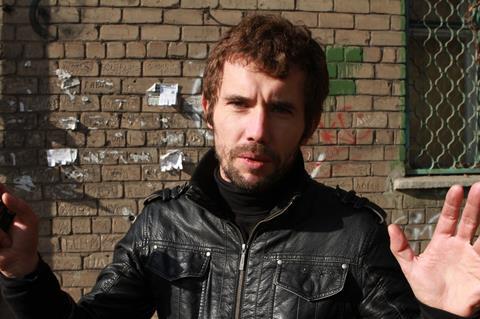
Friends and colleagues of Lithuanian director Mantas Kvedaravičius, who was killed in the besieged Ukrainian port city of Mariupol over the weekend, have paid tribute to the filmmaker recalling his “independent spirit” and “authenticity”.
“He was such a true and unique voice within the Lithuanian film industry,” said producer and long-time friend Giedre Zickyte of Lithuanian production company Moonmakers.
Kvedaravičius, 45, lived between the Lithuanian capital of Vilnius and Athens, working as a filmmaker and an academic.
He had strong ties with the city of Mariupol, having spent extensive time there for his documentary Mariupolis, which world premiered in Berlinale’s Panorama section in 2016.
The portrait of the Black Sea port followed ordinary citizens as they attempted to get on with their everyday lives against the backdrop of the ever-encroaching conflict in 2015 between Ukrainian forces and pro-Russia separatists, demanding autonomy for the Donbas region of eastern Ukraine.
Seven years later, the city is now bearing the brunt of Russia’s ongoing invasion of Ukraine. Since it began on February 24, Russian bombardments have destroyed or damaged 90% of its buildings, while more than 5,000 citizens are reported to have died and another 100,000 civilians remain trapped without access to food, water and heating. Prior to the invasion, the bustling industrial port city was home to 430,000 people.
Kvedaravičius returned to the city shortly after the invasion to cover events firsthand with the aim of reconnecting and even helping the people who had appeared in his film.
“Some people in their grief are asking why Mantas went back. Knowing Mantas and how he was connected to his characters, and his great, true soul, I imagine he couldn’t stay away from this tragedy. Mariupol was so dear to him,” said Zickyte. “He was never afraid of anything. He would always go wherever he felt he needed to go, and now we’ve lost him.”
Kvedaravičius travelled to Ukraine from Uganda, where he was shooting his new fiction feature film G.O.M.A.. “When the invasion started, he interrupted the shoot and went to Mariupol,” said his long-time producer Uljana Kim at Vilnius-based Studio Uljana Kim.
Veteran award-winning Lithuanian documentarian and mentor Audrius Stonys said Kvedaravičius’s decision to go back to Mariupol was characteristic of his dogged, independent and fearless spirit.
“He was very persistent. There were no flights to Kyiv. He travelled to Copenhagen, then Frankfurt and onto Kyiv. The biggest mystery is how he got into Mariupol and through all those Russian cordons,” he said.
Stonys recalled how Kvedaravičius had approached him early on in his filmmaking career, for advice on material he had shot in Chechnya.
Fearless
Kvedaravičius lived in the North Caucasus state from 2007 to 2009, covertly documenting the impact of the culture of Kremlin-backed abductions during Russia’s so-called counter-terrorism operation. His friends there during this time included the Russian journalist Natalia Estemirova, who was abducted in front of her Grozny apartment in the summer of 2009 and then shot dead, although this was not the subject of his work.
“He brought rough material but even then, it was obvious he was a unique, extraordinary artist. He has no formal cinema education, but he was a great talent and extremely brave,” he said. “He used to go to the most dangerous places and always managed to survive because of his honesty and openness.”
Kvedaravičius was also an anthropologist and archaeologist who held a PhD in social anthropology from the UK’s Cambridge University. His academic work fed into his filmmaking which often explored themes of absence, both material and bodily.
“He was one of the most intelligent, educated filmmakers in the Lithuanian filmmaking community. He spoke many languages. He was enigmatic and intellectual at the same time,” said Zickyte.
The material Kvedaravičius brought to Stonys would form the basis for his debut feature documentary Barzakh which played in multiple festivals, including the Berlinale where it won the Amnesty International film prize and a special mention from the Ecumenical Jury.
Festivals
In recent years, Kvedaravičius had branched into fiction. His first fiction feature Parthenon, on body and memory and based on in-depth research done in Odesa, Istanbul and Athens, premiered in Venice’s Critics’ Week in 2019.
The section’s then-director Giona A. Nazzaro, who is now artistic director at the Locarno Film Festival, recalled a filmmaker who was diffident about the brouhaha of the international festival circuit.
“His gaze picked up on layers of a reality that was otherwise invisible in cinema,” said Nazzaro in a statement reflecting on Kvedaravičius’s legacy. ”His images are profound, with a vertigo-inducing visionary strength. Over the years, I ran into Mantas many times. In Nyon, in Vilnius, around the world, at festivals. Sometimes he was with Uljana Kim, his friend and producer.
”Mantas was not an easy person, or perhaps he had a healthy distrust vis-à-vis a world that dealt with cinema, and yet did not or could not see a lot of things. So, he stood there, listening, perhaps trying to understand which elements of his work were of interest to cinephiles who already saw many (too many?) images.”
Dangerous
Capturing the events in Ukraine is proving an increasingly dangerous activity for filmmakers, photographers and reporters alike, even though under the Geneva Conventions, media workers are entitled to the same rights and protections granted to civilians in international armed conflicts.
“We extend our deep condolences to the friends and family of Mantas Kvedaravičius, who was killed while reporting from Mariupol, a city he had documented for years. His killers must be brought to justice,” said Carlos Martinez de la Serna, programme director of the New York-based Committee to Protect Journalists (CPJ).
“Kvedaravičius is at least the seventh journalist killed since Russia invaded Ukraine. Russian and Ukrainian authorities must bring those responsible to justice, and guarantee the safety of members of the press covering this conflict.”






![The Brightest SunScreen[Courtesy HKIFF]](https://d1nslcd7m2225b.cloudfront.net/Pictures/274x183/3/5/0/1448350_thebrightestsunscreencourtesyhkiff_312678.jpg)


















No comments yet